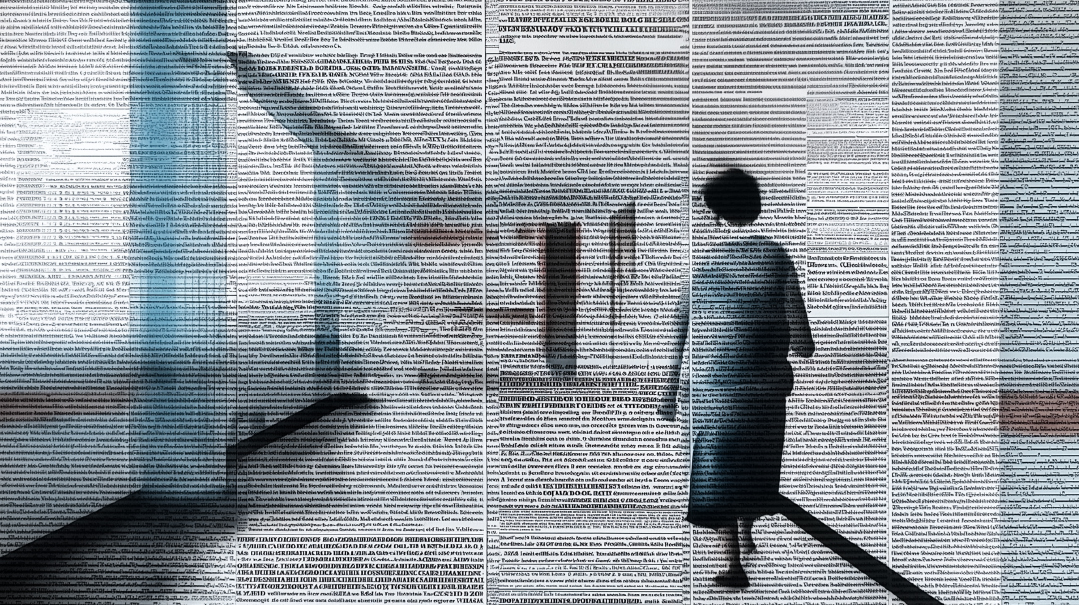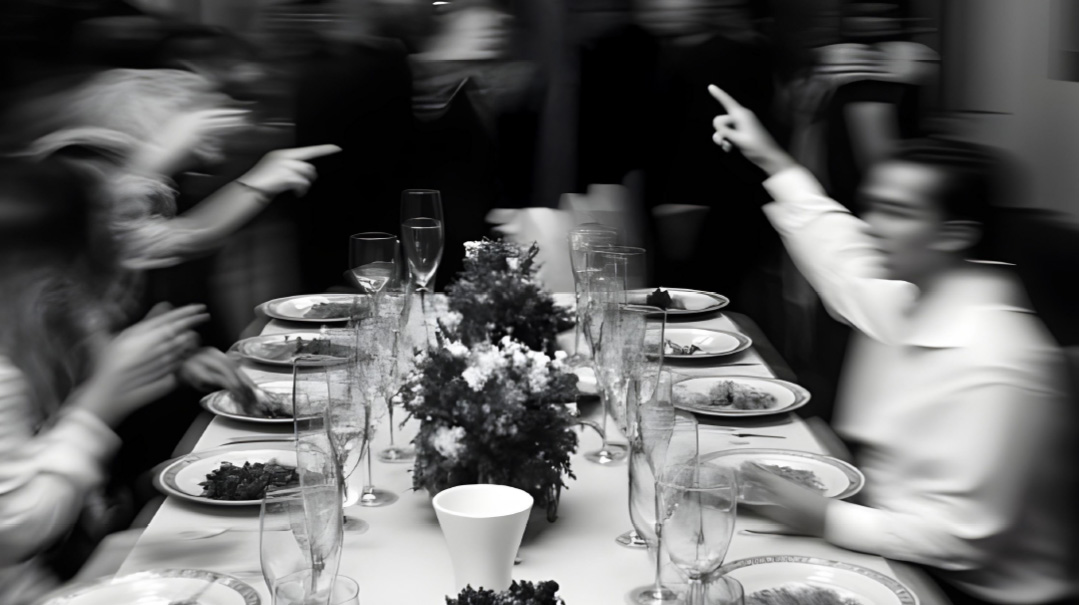The Third Step

I was a woman and I was single. What did that mean to my employers?

I
think I’ll give him another date.
I closed the door behind me, then stood on my tippy toes to peek through the window at the top of the door. I caught sight of the taillight on the edge of my peripheral vision. He stayed till I got in, good. Tante Rochel will be happy. My mother would be happy, too, but she’s in Cleveland, while I’m living in Brooklyn, for “shidduchim.”
The light was on in the front room, which meant that Tante Rochel was still up, most likely in the kitchen, and Uncle Leib was probably snoozing in the recliner in the living room. I took off my heels and tiptoed past him.
As I expected, Tante Rochel was sitting at the table, nursing a tea and doing a crossword puzzle. She greeted me as I entered.
“Went well?” she asked, putting down her pencil.
I shrugged my left shoulder. “Yeah.”
She smiled back, but not too deeply. It was only a second date, and when you’re 28, they don’t mean much.
“Call your mother, she’s waiting to hear from you,” Tante Rochel said. I nodded and started downstairs to the basement. Tante Rochel’s shoulders drooped; I think she wanted to hear more from me. But she’s not my mother, even if I’ve boarded in her basement for five years.
I took out my phone to call my mother, but a sudden exhaustion overcame me. I texted her instead.
Went well, gonna say yes. Talk to you tomorrow. Exhausted.
HE
had a nice time and would like to go out again. Does tomorrow night work? I read the shadchan’s text while I was at work the next day. Nice that he said yes, I thought. But presumptuous of the shadchan to assume I would, too.
Thank you, I had a nice time as well. I’m available Thursday night, not tomorrow. 8:00 please I texted back.
One change for the better when you’re an older single is fewer go-betweens. I spoke to the shadchan; he spoke to the shadchan. My parents were there for support, of course, but things were so much more efficient this way. Also texting shadchanim. Everything went so much faster.
I turned back to my emails. Nechi had sent out a farewell email to everyone at Hirsch and Becker. I was happy for her, though sad for me; I was losing my only single coworker. The rest were nice, but our friendship only went so far, and I got it, they were busy with their kids and husbands. And then there were men.
I got up to give myself a good cry in the bathroom. Walking down the hall, I heard a snatch of conversation.
“I got totally messed up in my salary,” Mr. Davidson, a new guy — he started three months ago — was saying.
I slowed down. He was talking loud enough that I’d be able to catch what he said next, and of course I wanted to hear it. There is something so yentish about salaries, and people are so secretive about it. There doesn’t even have to be company policy discouraging its discussion, people just don’t — except this guy.
“I was still in school, so they lowballed me. Had I started two months later, after graduation, I’d be making at least 5K more.”
I couldn’t hear the response, I was too far away. But Davidson’s voice carried to where I was, just at the entrance to the bathroom.
“Eighty.”
There was a water cooler right outside the bathroom, and I flipped the tap for the water to rush and clear my ears. Eighty? He just finished school, he didn’t have his CPA yet — and I was making $85,000. I was in a senior position, with seven years’ experience. I couldn’t have heard right. And he certainly wasn’t shortchanged. I’d started out at $50,000.
I needed to hear more. Skipping my self-pitying session, I walked over to Nechi’s desk. She wasn’t there, she was at my desk scribbling on a Post-it note. She started when she saw me.
“I was looking all over for you.”
“Yeah, I must talk to you.”
Nechi raised a brow but motioned me to come to the break room.
“I need to get back to work, I’ll take an early lunch in forty-five minutes.” I said, seating myself behind my desk, my chair rolling with me in it.
Nechi chuckled. “You’re too good an employee.”
That should have made me smile; in the past, that’s what it would have done. Now, though, it stung.
An hour later, I met Nechi at the café on the first floor of the office building.
“What’s going on?” Nechi asked as she placed her order of avocado toast and a latte. I nodded my chin at two men behind us who worked in operations. I didn’t want them to overhear.
“You’re being sneaky.” Nechi smirked.
I shrugged and placed my order for a tuna bagel and orange juice.
“You eat like your mother packed your lunch,” Nechi said.
“I like it,” I said, walking to the fridge to collect my orange juice, my go-to since third grade. I’m not one for change.
We collected our orders and made our way to the elevators. Who would be waiting for one, too, but Mr. 80K Davidson. I poked Nechi.
“Gonna tell you about him,” I hissed.
Nechi looked delighted. I’m not really the hushed whispering sort.
We got upstairs and made our way to my desk, where I recounted my eavesdropping.
When I finished, Nechi sat back. “So what are you gonna do?”
“Do?” I asked.
“Yes, do.”
I faltered. What was there to do anyway?
“You have to do something,” Nechi said, her voice rising.
“Shh,” I said, and then turned it back on her. “Like what?”
“Go talk to Mr. Cohen, tell him you want a raise, tell him you’ll sue based on gender wage discrimination, tell him he’s a schmoebagel.”
I laughed and shook my orange juice vigorously to buy time.
“I don’t know,” I said finally. “First, I don’t know if it’s true. Maybe I misheard.”
Nechi raised her brow, giving me a “you’ve got to be kidding” look.
“I’m serious! It doesn’t make sense that he’s making almost as much as me. I’m a senior accountant. They’ve promoted me, and not other people. They like my work.” I opened the orange juice, took a sip, and pulled a face as the acid hit me behind the eye.
Nechi shook her head. “Mimi, you’re cute, but a little naive. You still have this out-of-town optimism, a the-world-is-fair-and-bright attitude. You’d think living in New York these past five years might have broken some of that spirit.”
“What are you saying?” I opened my bagel, and scraped off the tuna on one side; they always put in too much.
“Come with me.” Nechi stood up and started walking toward her desk.
I scampered after her. Lunch would wait.
At her desk, Nechi towered over her computer, clicked around, and beckoned me to come around to her side.
“Look,” she pointed.
I glanced, and quickly looked away, my gut reflexes so fast I banged my shin on the side of her desk.
“You can’t show me this,” I hissed. “If anyone finds out, it’s a fireable offense.” I bent and rubbed my leg.
“Good thing I’m leaving anyway,” Nechi retorted. “What good is being friends with the payroll manager if she can’t help you? And besides, we’re just confirming what we already know.”
The argument didn’t win with me, but I’d already seen what Nechi wanted me to. Davidson was being paid eighty thousand dollars.
“What are you thinking?” Nechi asked.
“I dunno. Confused.” I sat down on the chair next to her desk, resting my aching foot.
“Why are you so surprised? You’re worldly. You didn’t think the gender pay gap existed?”
“I guess I never thought about it in context of me. They always mention maternity leave and childcare as reasons woman don’t advance in the workplace. That’s not me. Also, I guess I’m naive. I thought a frum place would be different.”
Nechi snorted.
I held up a hand. “I have a date on Thursday. A third,” I tacked on before Nechi could ask. “I’m gonna ask him.”
“Well, that’s one way to start hashkafah talks.” Nechi said. “But don’t say I didn’t warn you.”
T
ante Rochel was sitting at the kitchen table examining the ShopRite circular when I came home after six that night.
“He said no?” she asked.
Did I look that bad? I tried to shrug and continue down to the basement, but she pulled out the chair next to her, and patted it. “Come talk to me.”
I sat down and waited for her to start.
“Mimi, you know you’re an amazing person. He just wasn’t the right one. It doesn’t reflect on you.”
Ugh, I did not need this. Ever.
“We’re going out again,” I said.
“Oh!” Tante Rochel said. “You looked upset, so I assumed….”
“It’s work stuff,” I copped.
Tante Rochel’s face read bored. But to her credit, she stood up, pulled a package of Jewish-brand Oreos from the cabinet, opened it, and left it on the table. I didn’t bite.
“What’s going on at work?” she asked. Her face was back in the circular, she’d made a big circle around pasta.
My issue was not as boring as Tante Rochel’s face told me it was, I was sure. Besides, I thought, I wonder what her take on this is. Would it shock her? Provoke her?
“My boss is underpaying me by at least twenty thousand dollars,” I said and waited for a reaction. It hit me then. Wow, that’s a big number.
Tante Rochel’s mouth gaped a little, and she leaned in. So I got my confirmation. Not boring.
“What do you mean?”
I gave a quick rundown of my accidental snooping. “What would you do?” I finished.
Tante Rochel placed her hand over mine and clasped it. “Sheifeleh, you must say something!” she said, her eyebrows dancing.
I pulled back. It seems no one but me had to think about this. Why was everyone so quick to action? Did they not see the complexity I saw?
But Tante Rochel was not finished. “Imagine how much more you could help your parents if you had an extra twenty grand to play with?”
“What?” I pushed my chair back unconsciously, and it grated on the floor.
“I know you help your parents out, and there’s school and camp registration coming up. And Nesanel’s bar mitzvah next year. With more money, you could make their lives so much easier,” Tante Rochel explained as if I didn’t know one and one made two.
“What if I was married?” I asked.
Tante Rochel took an Oreo, twisted it open, then rubbed one side against the other to distribute the cream more evenly. She was hesitating. She’d never otherwise touch an Oreo.
“You can still help your parents if you’re married,” Tante Rochel said. “Especially since you’re dating working guys. You won’t have to work when you’re married.”
Was she serious? “Dating men who are working has nothing to do with me working.”
Tante Rochel took a bite of the cookie in her hand. She must’ve been very uncomfortable.
“I’m just saying….”
There was so much I wanted to say to Tante Rochel, but I’m confrontational like she thinks before she speaks.
“I hear,” I said instead. I stood up, and instead of going downstairs, I left the house.
“You can’t say you like sushi if you only eat the vegetable or cooked fish rolls,” Nechi said the next night, both of us seated in Café Tokyo. The waiter had taken our order; now it was time to talk. The past day had just been a repetition of conversations I’ve had with one person or the next. It was getting boring and exhausting; I almost resented Nechi for confirming the issue in the first place. I’d been fine being ignorant or in denial.
I scratched my cheek, and Nechi drummed the table.
“Do I have to drag it out? What’s up?” she asked.
“Do you know my aunt didn’t even think about gender pay gaps and rights, she just thought I could give my parents more money and that even if I marry this guy, I can still give my parents money because he’s working.”
Nechi’s eyes bugged. “Your aunt’s clueless.”
“Hey!” I interjected.
Nechi raised her hands to deflect. “I’m sure she knows lots on this topic, but she’s clueless.”
“I left the conversation after that.”
Nechi laughed. The waiter returned with our drinks,; Coke for me, limonana for Nechi.
“But she agrees you need to say something, is the point. So besides being too eidel to raise the issue, what’s stopping you?”
I cracked open the top of my Coke, inserted the straw, leaned forward, and took a sip. The fizz went straight to my sinuses.
“It has nothing to do with eidel. Am I the only one who’s considering step two?”
Nechi looked puzzled. “What do you mean?”
I took a deep breath. I’d had some time to think about it, but sometimes things that make sense internally don’t hold up to verbal scrutiny.
“Okay,” I said, ticking my fingers. “So I go over to Mr. Cohen, I tell him everything you told me, everything I overheard, I tell him about discrimination law. What’s he going to say?”
For once Nechi was quiet.
“You think he’ll say, ‘Ms. Kraus, I never thought about it that way, here’s twenty thousand, and I’ll tack on another fifty thousand for back pay?’ ”
Nechi chortled. “You’re funny when you try to be sarcastic.”
I ignored her and continued, “Most likely he’ll find some legal reason why this guy is making almost as much as me. Or he’ll just deny it. Maybe he’ll give me a slight raise, but the whole thing will be adding insult to injury.”
“You wouldn’t take a slight raise?”
“Nechi. It’s like a butterfly bandage on a gaping wound.”
“You should write,” Nechi said. “Accountants are boring, but your similes are fun.”
“Stop it,” I said, waving my straw wrapper at her. “Think, really, what’s gonna happen? The only way for me to keep my dignity is to either get twenty K or leave.”
“So you’d rather have nothing than take a risk?”
I slumped in my seat. The waiter arrived then with my order, so I had a minute of distraction, pulling out the chopsticks, separating them with a snap, and dousing my California roll in soy sauce.
“I like my job, I like what I do, I like the location, I like the people I work with, and up until a few days ago, I was satisfied with the pay as well. My parents are in chinuch, they make eighty K combined, and they have eight kids. I’m raking it in, comparatively.”
Nechi grimaced when I mentioned my parents’ income.
“It’s the principle,” she countered. “What Hirsch and Becker is doing is wrong. You’re putting in the same exact work, the same hours, same results, but you’re paid significantly less because you’re not just a woman, but a single woman, who seemingly has no expenses or responsibilities. So they’re like, ‘your entire pay is disposable income.’ ”
“Do you think it’s so wrong to base a salary on someone’s needs?” I asked.
Nechi gave me a look like I was deranged. “First of all, you never know someone’s needs.” She banged on the table for emphasis. “But someone’s needs have nothing to do with the job they do. People bring their skills and expertise to the job, that’s why they’re hired. If people need chesed, there are organizations for that.”
I took a piece of sushi and deftly got the entire thing into my mouth. I took a long time chewing.
“And what about other girls who will come after you?” Nechi continued. “If you put up with this garbage, the company will expect the rest to fall in line.”
“So I should sacrifice my comfort for the future generation?” I asked, my chopsticks poised between my fingers like quotation marks.
“Exactly.”
I made a face.
“And just think how much more money you could bring into a marriage. You’re cheating your future husband.”
I laughed. “You’re just as bad as my aunt.”
Nechi smiled and finally started on her own Dragon roll.
“You make sense, practically speaking,” Nechi conceded two pieces later. “But you’re still wrong.”
I sighed and shrugged. We ate quietly for a few minutes; I looked around the café, wondering who else was there at 9:30 p.m. There were a bunch of high school girls in uniforms giggling over lattes, two guys hunched over computers, a middle-aged couple sharing a plate of whole wheat pasta, a guy in the corner by himself, on his phone. All these people. What would they do in my situation?
I
hate going to restaurants on dates. I love the food, but I hate the follow-his-lead on what we’re buying. Apps, no apps? Straight to main? Please, please splurge for dessert, I like cake. And definitely no slushy drinks for me. Also, the restaurants in the city are so squishy. I’m closer to the businessman at the table to my right than my date.
But the checked shirts of the waiters in Al Dente were a fresh change. I could do this.
“Crusted mozzarella strips served with homemade marinara sauce. That’s a fancier name for mozzarella sticks, right?” my date said. His name was Yechiel, but I preferred not to think of it or refer to him by it until at least the fifth date.
I chuckled.
“And ziti noodles smothered in layers of mozzarella, Muenster, and cheddar with complementing tomato aioli is plain old baked ziti,” he added, moving down the menu.
“It does sound better, doesn’t it?” I took a sip of water. It was ice-cold — instant head rush. I put pressure on my temples.
“Yes, but I didn’t come to a restaurant to eat what my mother makes for dinner, or what I can get at a local pizza store.”
I picked up the menu to try to play his game. I was grateful for these safe foods, no matter how they named them. I’m not a fan of trying new things, and definitely not on a date.
“Look.” I laid the menu flat and pointed to the soups. “French onion soup here, just now it’s caramelized onion with cream, and topped with crusty bread.”
He smiled at me. I smiled back. Then his tie caught my eye. I think my father has the same one.
“But I don’t agree,” I said. “I like my oldies but goodies, and usually restaurants have upgraded the home-cook classics.”
“You’re saying I should order the baked ziti?”
“No, but I will.” And I did.
Our meals were served and the date proceeded, smooth and easy. Nothing compelling, we seemed to have stalled on fluff, but I could already see myself going out again, why not?
There was a pause in conversation while we waited for the waiter to clear our plates and bring the dessert menu.
“Let me ask you,” I started when the waiter moved away. I saw him perk up; I think this may be the first topic I initiated. “I’ve been talking with my friends at work about the pay differences between men and women in the frum workplace. I was wondering how the men see it.”
He shifted in his seat, looking slack-jawed, and I braced myself for a reality check. Unless he’d chicken out. Either way, I had my answer.
“This is not my opinion,” my date prefaced. “I’m just repeating what I’ve heard other guys say.”
Okay, so he’s gonna be honest, but he won’t own it. I narrowed my eyes as I thought about this. Should I give him credit for knowing that the views he’s about to share are wrong and trying to distance himself from them?
“There’s definitely an attitude of women being not as important,” he started. “And if a woman really does prove herself, they’ll promote her, because that’s in the company’s best interest, but they won’t pay as well as if they promoted a guy.”
I felt exposed, like he’d just looked at my personal file.
“Why?” I prompted.
He shrugged. “Guys talk about maternity leave, and kids, and how women can’t dedicate their lives to the job like men can.”
“But what about single women?”
Now he really squirmed. “Guys say they don’t need the money.”
I harrumphed.
He picked his hands up, open palms. “I’m just telling you what the guys say.”
The waiter came back with the dessert menu. I ordered New York cheesecake and coffee, he ordered something ganache.
“So what do you say?” I took a sip of water and resumed where we left off.
“I’m all for equal pay for equal work, but it’s not always equal.”
“Meaning?”
“Y’know, maternity leave, childcare when the kid’s sick.”
“The company I work for has paternity leave. No one uses it though. And why can’t men watch their sick kids?”
“They could, it’s just expected that the mother does it, I guess.”
I cocked my head. This conversation was tiring me. I’d heard what I needed to hear, and I couldn’t kill the messenger. He was a good guy, but he wasn’t going to change the world’s attitude. Which was fine; neither was I.
The table to my left erupted in Happy Birthday, and suddenly half the restaurant joined in as two waiters approached the table with a cake topped with sparklers. It was a good distraction. The waiter with our desserts came up in the rear, even better.
I took a huge bite of cheesecake. It was rich and creamy. I dabbed the corner of my mouth with my napkin.
“It’s delicious, thank you,” I offered. That led to a discussion of favorite types of cheesecake, then Shavuos, and more fluff. Good.
Tante Rochel was miraculously not in the kitchen when I came home. Uncle Leib was in the recliner. I crept down the steps, careful to avoid the creaks lest Tante Rochel hear that I was home. I’d had a nice time, like the previous two dates. The only moment of seriousness or contention was the pay-gap discussion and even that was mild, considering he wouldn’t own what he was saying.
MY
phone was ringing. It was in my desk drawer, put away so I wouldn’t get distracted. I really had to get the Pinesmith spreadsheet sorted. I’d promised my boss an update by the weekend, and I was not interested in staying late on Friday to get it done.
Curiosity won. I pulled open the drawer and glanced down. The shadchan? Why was she calling? What happened to texting?
And then it dawned. He’d said no. It’s rude to text a no. I was ambivalent about how I felt about that. I declined the call and texted her:
Busy at work. I’ll call in 10
I wasn’t so busy, I just wanted to finish the column I was working on. Then I’d need to find someplace private to talk. The bathroom was probably the best choice; it was raining outside.
I looked in the mirror before I called. Did I look as conflicted as I felt? I traced a fine line leading from my nose to the corner of my mouth. Was I the only one that saw that? I dialed.
“Mimi, so glad you called. So he said yes. Are you available to go out Sunday?”
“Why are you calling and not texting?” I cut to the chase, which is so not me. What had gotten into me these days?
“Well…” The shadchan sounded a little flustered. “I wanted to talk to you for a minute. Yechiel made a comment that I thought was worth sharing with you.”
Comments are never about how nice or beautiful you are; I grasped one of the sinks for support in case I needed it.
“Listening,” I prompted.
“It’s nothing really, he just felt like you dress very out-of-towny. He wondered if you ever dressed more with-it. So I was thinking maybe to dress up for the next date.”
Good thing I was leaning on the sink. I went quiet; I needed to process this.
“Mimi, are you there?”
“Yes,” I said. What was wrong with what I wore? Was it my shell? But it was black, not white. And if he knew my heels were from Amazon then that’s his problem.
“You’re not offended, are you?”
“He’s not the sharpest dresser himself,” I said aloud, thinking back to the tie that matched my father’s.
“I know, I know, I told him to get a new coat, but he laughed and said he likes the one he has. But you know it’s normal for men to expect a woman to dress up.”
“But not the other way around.”
She chuckled. “Mimi, I didn’t know you were a feminist.”
I bristled at the word. Was that all it took to be branded a feminist these days, a little common sense?
“I’m not. I’m just saying it’s a double standard.”
“Yes,” she conceded. “The world is like that sometimes.”
I took a deep breath; the clarity of another discrimination gave me strength. I watched my face in the mirror as I spoke. My eyes were wide and alive.
“Thank you so much for working so hard on this shidduch, but I don’t think it’s going to work. We had a nice time, but we have different values.”
“What?” the shadchan started.
“You’ll let him know, right?” I said. “Thank you again.” I pressed end on my phone. She’d probably never redt me another shidduch, but my chest was puffed with pride.
A lock unlatched from inside the bathroom. I jumped. I’d forgotten to check that the place was clear when I came in. I turned and saw Nechi. Phew.
“I only heard your side, but I can guess everything she said.” Nechi grinned like a Cheshire cat.
“Am I crazy?” I asked. Saying no suddenly felt foolish and rash.
Nechi walked to the sink near me.
“I think you’re epic, but would I have done that? I don’t know.”
“I’m feeling this agitation I’ve never felt before.” I rubbed the base of my neck.
“It’s called outrage,” Nechi deadpanned. “Nice that you’ve never experienced it until now.”
“What do I do?” I asked.
Nechi looked confused.
“You already said no.” She washed her hands, turned off the sink with her elbow, and reached for the paper towels.
“I’m talking about my salary.”
“Well, you need it now that you’re not getting married.”
We both burst out laughing.
“Wait, wait,” I said after catching my breath. “That’s it. I don’t need the money. I’m a single girl, all I need it for is to go on vacation and buy clothes to make me look like a New Yorker.”
Nechi started laughing again.
“No, wait,” I said, holding her shoulder to steady her. “I’m serious. I don’t have anything to lose but my job. There’s no one relying on my paycheck. I can quit and travel the world if I want.”
Nechi took a deep steadying breath.
“Are you saying what I think you are?”
“Yup. B’makom she’ein ish—”
“Be an ishah!” Nechi slapped her knees and started losing it again.
“No, I’m serious. You couldn’t do it.”
“Nope,” Nechi agreed. “Rent, groceries, and all that fun stuff is coming up soon. In the meantime, I’m still buying sheitels and furniture, and a plaid sleeve warmer for my glass cup so I don’t burn my hand when I drink tea.”
We went quiet and stood contemplatively for a minute. It was crazy, all of it. None of this lined up with the checks and balances, right and wrong, fairness and justice that I still somehow believed, despite everything, that the world’s existence hinged on. Maybe that was crazy bit. But maybe the world needed a counterbalance and no one but me could be it.
I opened the bathroom door, strutted for the first time in my life, and poked my head into my boss’s office.
“Mr. Cohen, do you have a few minutes?”
(Originally featured in Family First, Issue 947)
Oops! We could not locate your form.







